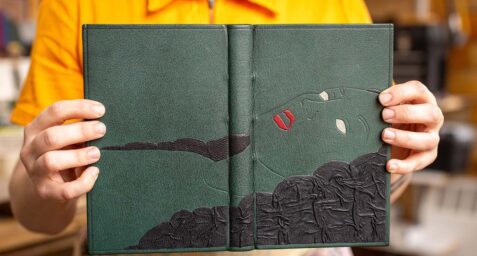Abra Mueller BB ’23
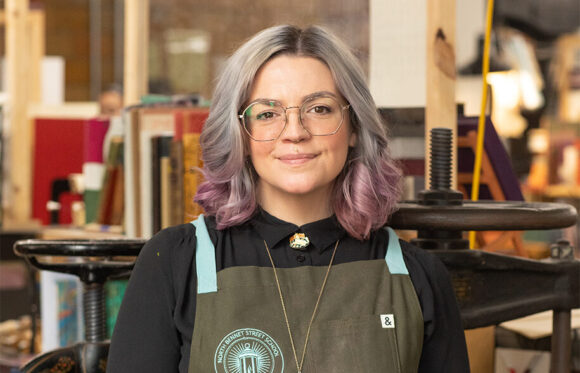
Bookbinding ’23
East Boston, MA
When/how did you discover your discipline/field?
Over a decade ago, I graduated from the University of Southern Maine with a bachelor’s in music, focusing on early music, which includes Renaissance and medieval music. I worked with Renaissance and medieval manuscripts and facsimile editions of those manuscripts for a long time for research purposes and for transcribing music for performance.
Seeing those early manuscripts ignited a passion for the history of the book as an object and as a vessel for the passing on of the history of the world. That started me down a path of wanting to learn about book history, book structure, and preservation of books and manuscripts.
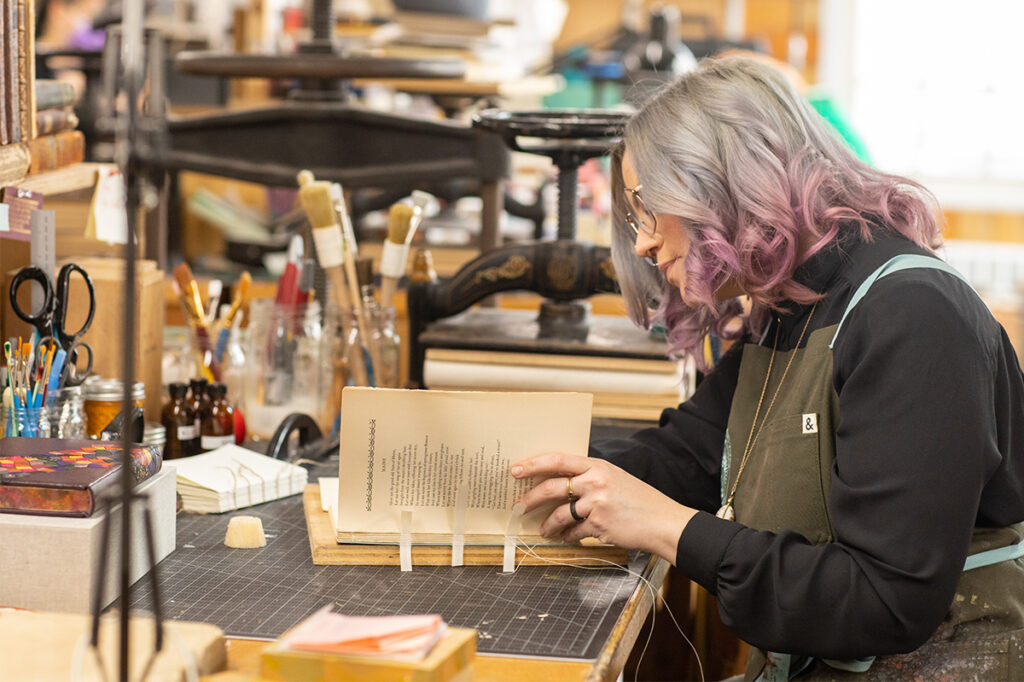
From there, I looked into archives as a field. I decided to get a master’s degree in library science from Simmons University, and I was exploring the world of archives and preserving rare books, manuscripts, and collections. What I discovered was that I was far more interested in the hands-on work of conservation, rather than preservation.
Preservation is more of a proactive approach to maintaining collections; you are looking at things like monitoring HVAC systems, making sure collections are in unbuffered and acid-free folders, and creating disaster plans for your collections. Conservation is more reactive; you are assessing a book or a manuscript and may need to fix a tear in a piece of paper or rebind a book that’s falling apart. Preservation tries to prevent those things from happening in the first place.
I started researching how I could get my foot in the door of the conservation field.
How did you discover NBSS? Why did you choose to attend the School?
During my last two semesters at Simmons, I made connections with a few folks who were taking some history of the book courses and rare book and special collection courses with me. They were also passionate about book history and book structure. A friend of mine said, “I’m applying to North Bennet Street School to be a bookbinder and to learn more about conservation.”
I looked into it and thought, “This is it.” Because getting a graduate degree in conservation is very difficult and expensive and there are prerequisites before you even can apply. That is prohibitive to a lot of people, especially financially. I had kind of given up and thought I was never going to be a conservator. Then, when I got pointed toward the Bookbinding program at North Bennet, I realized it was possible.
So many bench conservators in the New England area and the Northeast have degrees from North Bennet. The field knows us, they know the work that we do, and we get hired.
Can you name one of your favorite experiences in the program?
We had the opportunity last year to travel to Pergamena, a tannery in New York State. They produce leather and parchment and have a great relationship with us at North Bennet.
We got to spend a long weekend learning how to make parchment—which is actually a disgusting process! It truly is the grossest thing, and it stinks. You get covered in slop, and it’s not for the faint of heart. But, I loved the opportunity to see and be part of a process from start to finish. We were given the skins and scraped them and turned them into parchment. I still have the parchment that I made and someday soon I’m hoping to use it for a binding.
It was so special to be able to dig deep into our craft. That’s what this program is about—two years straight of digging deep into our craft. This was one extra way that we got to do that, and I was fortunate to be able to participate.
Can you describe the NBSS community in just a few words?
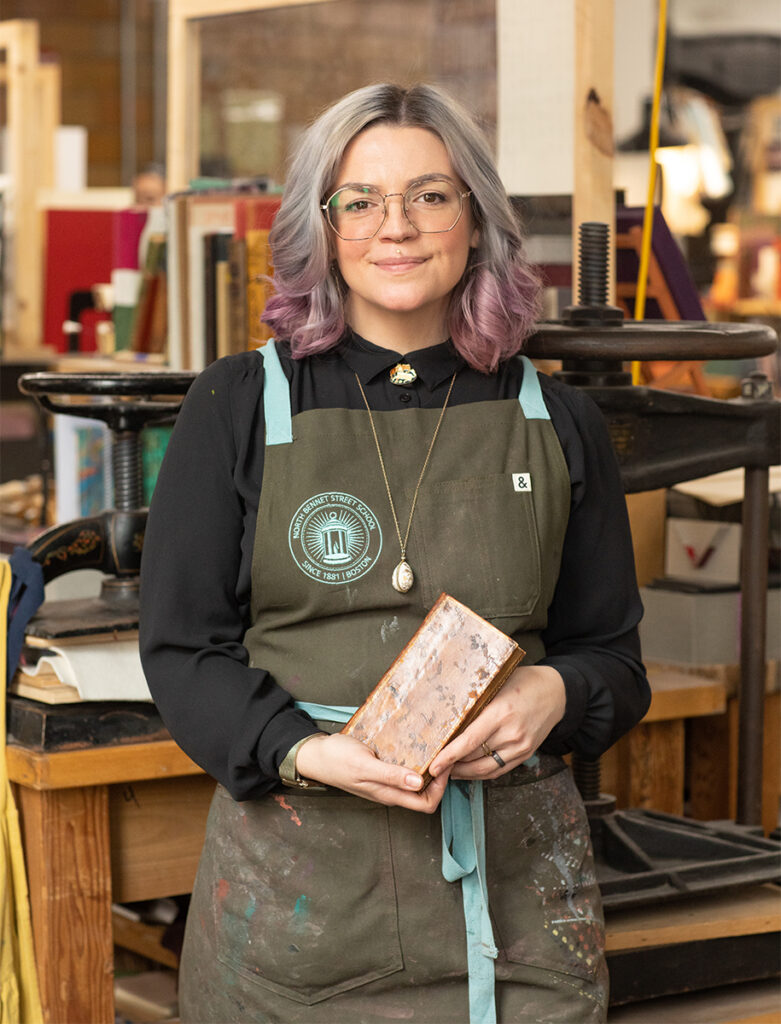
Community-oriented, collaborative, passionate.
Let’s talk about your instructors. What have you learned most from them?
Jeff Altepeter BB ’99, Bookbinding Department Head, is an incredible instructor. The way he explains things is so crystal clear. It’s amazing how being a good craftsperson is entirely different than being a good educator. To be able to be both of those things is an incredible skill and so few people have it. Jeff has that skill. He’s an exceptional artist and binder, and he is an exceptional educator. He knows exactly how to describe something so that you get it. And if you don’t get it, he knows how to describe it in another way.
There is one piece of advice he gave that really sticks with me. Occasionally I went to him and said, “I’m not getting this. I’m not doing it right. What do I need to do to do this better?” His answer, more often than not, was to do it 50 more times. Coming from academia, I remember thinking the first time he said that to me that it was not an answer. That’s not enough—I need specifics! It took me a long time to realize that he is absolutely right. He had already given me the skills; he had already given me the answer. The answer really is, practice.
I did some production work making 25 clamshell boxes, which is a cloth-covered box that houses a rare or very fine book. It’s a protective enclosure, and they take a lot of time to make. If you have 25 to make, you have to do a lot of prep on the front end and then go over and over doing the same thing constantly. By the end of it, I became a better binder. I became a better craftsperson because the answer was to do it 50 more times.
What are some ways you have felt supported at NBSS?
When I first enrolled at North Bennet, I received scholarship funds. I had never received a scholarship for anything in my entire life. I took out student loans to pay for my prior degrees, but I had never received financial aid that I didn’t have to pay back. This was the first time I felt like, “Wow, I must be doing something right. This is incredible that someone wants me here enough to offer me aid to come here.” That was a boost from the beginning.
Then, last summer, my financial situation changed dramatically, to the point where I thought I was going to have to quit school. I was ready to pack it in. Claire Fruitman CF ’96, Provost, advised me to talk to the Financial Aid Office, so I wrote a letter explaining my situation. They were able to make changes to my support so I could finish the program. It was a miracle because I don’t know what I would have done otherwise.
I am truly amazed and so grateful for the hoops they had to jump through to make sure I could stay here.
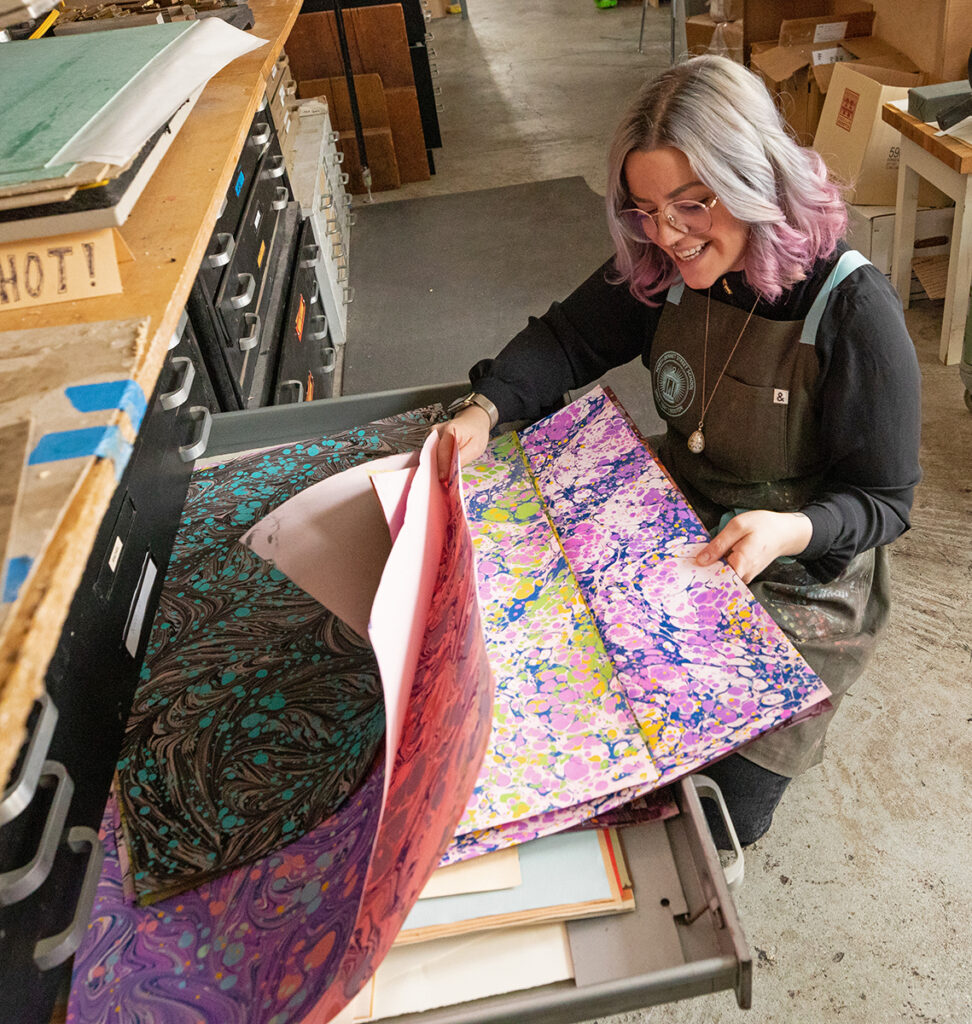
In addition to the financial aid supports, the other incredible support the School offers is the alumni network. When a graduate of the Bookbinding program at North Bennet finds out that you are going to be in the program, you are scooped up and brought into the fold. People want to help you.
The first week that I was in Boston, I went to a talk at the Boston Athenaeum about a Guild of Bookworkers exhibition that was happening there at the time. I showed up and started chatting with a few other people, and it turned out they were North Bennet alums. They all gave me their cards, followed me on Instagram, and are now my friends and cohort and truly there to support me.
One of the people I work for now is an alum of the program, and she has been my biggest cheerleader, helping me along and giving me advice.
The most exceptional thing is that the North Bennet community continues after you leave. There are so many of us, we loved the experience that we had, and we want people to go into the program next to experience that as well. We’re very lucky to have that.
Can you describe your work in just two or three words?
Meticulous and thoughtful.
Besides working in your field, what else keeps you busy?
I am an early musician and try to keep active in the early music community and stay connected to other musicians that I have met over the years. I sing and perform as much as possible.
I’m also a knitter; I knit a lot and do other work in the fiber arts field. We’re craftspeople. We work with our hands in any way that we possibly can!
What motivates you?
What motivates me the most is the protection of cultural heritage. The most important thing to me is maintaining the historical record. Being part of that gets me a little emotional. It’s an incredible privilege to be able to do that.
The other day, I opened up a book at the Brattle Book Shop, an antiquarian bookseller in town. It was a late 18th-century textbook about George Washington. On the inside front cover, a kid had drawn a doodle of George Washington, and on the backside, they had drawn a doodle of his horse. Little things like that are part of the history of the object and tell us so much about the people who used them; that is really motivating to me in the preservation and conservation of these objects. Because it’s not just the object we’re preserving. It is our history or someone else’s history.
What’s next for you?
I currently have two temporary jobs for the summer. I am working at the Harvard Library Collections Care lab, where I’m building enclosures for their library materials, some of which are circulating and some of which are not. I am also heading back to the Northeast Document Conservation Center (NEDCC) in Andover, Massachusetts, where I interned last summer, to do conservation work.
My hope is to find a full-time position in a conservation lab in whatever form that takes, whether that be in an academic institution or at an institution like NEDCC, which is built exclusively for conservation. I’m already here, so it would be cool to find something in Boston. But my partner lives in Chicago, so I’m looking out there too. It’s just one step at a time.
Editor’s note: Abra has since joined the Northeast Document Conservation Center as an Assistant Conservator!
This story is from our Summer 2023 issue of Benchmarks magazine. View more issues.
